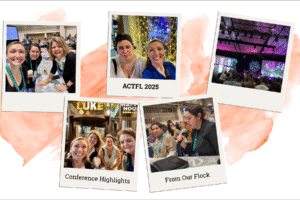
How to Prepare for a Foreign Language Oral Exam
One of the more challenging aspects of learning a language is speaking it for an oral exam. Preparing for any exam can bring anxiety, but talking at length in a new language is particularly challenging. Follow the guidance below to help nail an upcoming language oral exam confidently.

Listen to Media in the Target Language
The best way to learn a language is through consistent exposure. Students today benefit from streaming services that offer their media in many languages right at their fingertips. Listening to podcasts, watching television shows, or reading books in the language you’re learning will improve overall comprehension. Be sure to pause and look up any unfamiliar words to expand your vocabulary.
How to Prepare for a Foreign Language Oral Exam
Nail down accents and proper pronunciation by repeating after the speaker. This will also help your palate form muscle memory, making speaking the new language more manageable and more comfortable over time.
Master Grammar
To demonstrate mastery of a world language, incorporate multiple verb tenses in each of your oral responses. Examiners will often look for a student’s correct use of past, present, and future tenses. Students who can correctly use more complex verb tenses like the subjunctive or past imperfect will impress the examiner and prove their linguistic prowess. Review conjugations of regular and wildly irregular verbs to help improve speaking ability.
Practice and Incorporate New Vocabulary
The last situation a student wants to find themselves in is grasping for a word in the middle of their oral exam. In the days and weeks before an exam, try to review and practice vocabulary by incorporating it into phrases. Many oral exams ask the students to speak about themselves or a situation that has happened to them in the past; try practicing a potential scenario you may encounter in an exam and take note of any words you do not know offhand. Practicing possible responses often will build confidence.
Practice with a Native Speaker
Last but far from least, prepare for your oral exam by registering for tutoring or conversation lessons with a native-speaking instructor. Students who need help with grammar may benefit more from tutoring lessons. At the same time, those looking to focus on their speaking ability should find what they need with conversation lessons—online services like LanguageBird place students with qualified teachers from all over the world.

Fluent Speakers Help Fluency
Practicing with a fluent speaker in real-time will help rectify standard grammar or pronunciation errors. The tutor will provide additional vocabulary tips or the correct verb tense. A native-speaking instructor can offer students common phrases and idioms to incorporate into their oral exam responses. Students often come away from lessons with native instructors with more confidence speaking the new language, which is integral to doing well on oral exams.
Both tutoring and conversation lessons are beneficial for students preparing for an oral exam. LanguageBird’s native speaking instructors offer hour-long sessions taught in a one-to-one format online to maximize student learning outcomes and give students the attention they need to build confidence speaking a new language. Are you interested in signing up or learning more? Contact us today!




